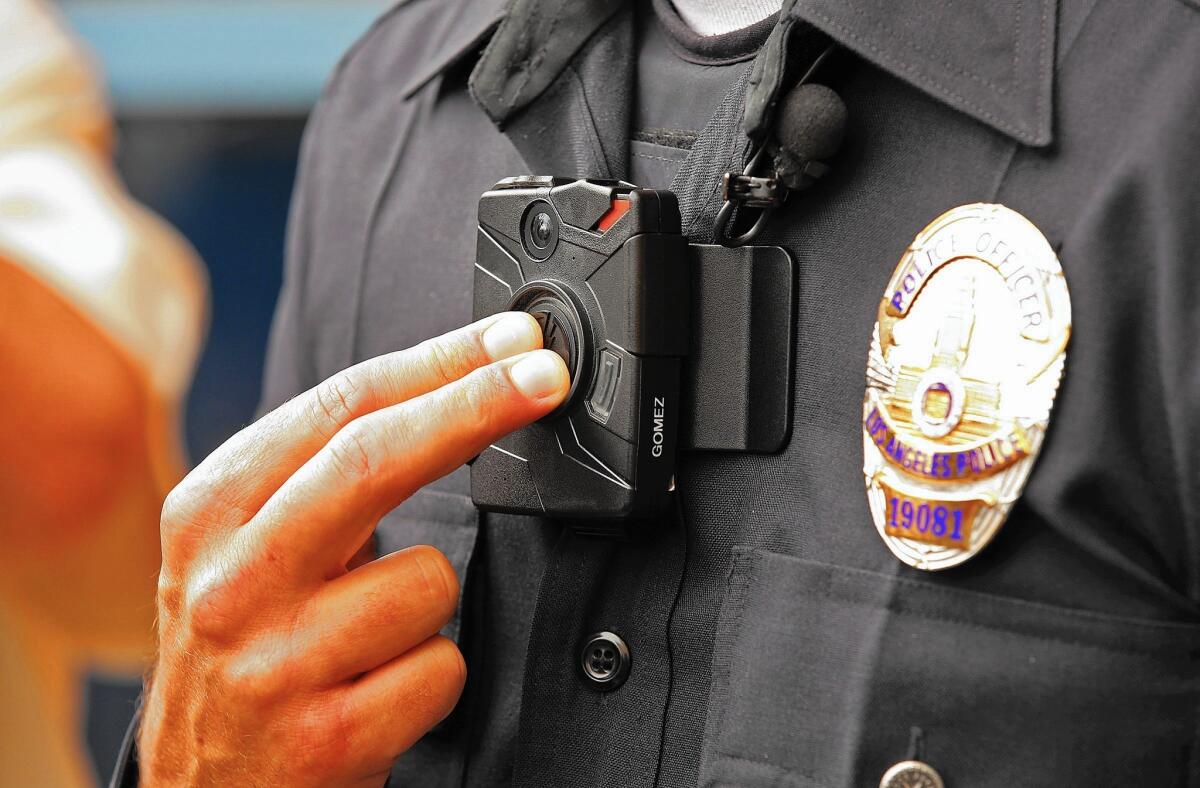Councilman seeks review of LAPD body camera plan, but prolonged delay is averted

Restarting the bidding process on body cameras for LAPD officers could have delayed rollout of the cameras by at least a year, officials said.
- Share via
Amid mounting concerns over delays in putting body cameras on thousands of Los Angeles police officers, a City Council member formally asked Wednesday for several reviews to determine whether the Police Department selected the best product at the best price.
Councilman Mitch Englander’s motion took a step back from his call last week for the LAPD to restart the vendor selection process and accept new bids.
That proposal prompted an awkward back-and-forth between Englander and other city officials, including the mayor and police commissioners, who said they feared a new bidding process would push the completed rollout of the 7,000 cameras back at least another year — a delay Mayor Eric Garcetti called “unacceptable.”
Instead, Englander’s motion calls for the Police Department and other city agencies to look at other large contracts for cameras by departments around the country to determine whether the LAPD used the best process to select its camera vendor. The motion also seeks a review of the body camera market as well as an analysis of how much the cameras could save the city in costly police-related litigation or investigations of complaints against officers.
Englander said his goal was to formally answer outstanding questions from his fellow council members, who he worried might reject the body camera initiative. He noted that on Friday, the council voted to temporarily move some city funds earmarked for body cameras to housing programs.
On Tuesday, however, the council reversed its decision and moved the money back to fund the camera initiative. Englander said he believed the action reaffirmed the council’s support for putting cameras on cops.
Police Commissioner Steve Soboroff, who has spearheaded the effort to bring body cameras to the LAPD and had expressed concerns about the delays, said he was relieved that Englander’s motion did not seek a new round of bids.
The LAPD already has deployed about 860 cameras, purchased through private donations. Last year, the department negotiated a contract with Taser International to provide thousands more as well as replacement equipment, digital storage of the recordings and thousands of Tasers.
Weeks later, the City Council balked at the program’s price tag: $57.6 million over five years, including a $31.2-million contract with Taser. Council members also voiced dismay that the initiative would require scores of LAPD officers to review recordings and oversee the program, a plan the LAPD quickly revised to include more civilian staffers.
A new vote was never scheduled.
LAPD officials said current delays would push the completed rollout to the fall of 2017 at the earliest, well beyond Garcetti’s previous pledge to finish by the end of this year. Starting a new bidding process, officials said, would have moved the completion date to the end of 2018.
Maggie Goodrich, the LAPD’s chief information officer, estimated it would take the department about 90 days to put together the reports sought in Englander’s motion. The new estimate for the completed rollout, she said, is early 2018.
But the cameras continue to spark controversy beyond City Hall. As one group of activists held a news conference Wednesday to demand the quick distribution of cameras, another sent lawmakers a letter calling for more changes to the program.
The letter, signed by nearly a dozen groups, including the American Civil Liberties Union of Southern California, urged the council to reconsider the policy for LAPD body cameras that was adopted last year. Critics have said the policy doesn’t allow for public review of the footage and unfairly lets officers see the recordings before writing their reports, undermining the transparency advocates say the devices bring to policing.
Robert Saltzman, the only police commissioner to vote against the policy, said he agreed with the underlying concerns described in the letter but believes the initiative should still move forward.
“The sooner we implement the on-body camera program, the sooner we will begin to have the information necessary to review the policies that govern their use,” he said, “and the sooner we will benefit from the increased transparency and accountability.”
Twitter: @katemather
ALSO
Bullet train agency is expected to go forward with business plan despite widespread criticism
Santee community rallies in support of a gender-neutral bathroom after fight
As UC Berkeley tries to close its deficit, administrators feel the ire of traditional faculty allies
More to Read
Sign up for Essential California
The most important California stories and recommendations in your inbox every morning.
You may occasionally receive promotional content from the Los Angeles Times.














